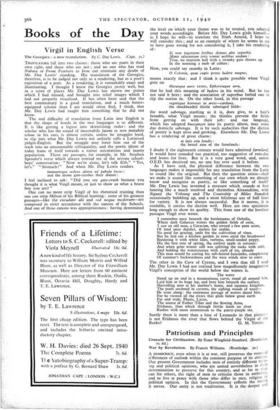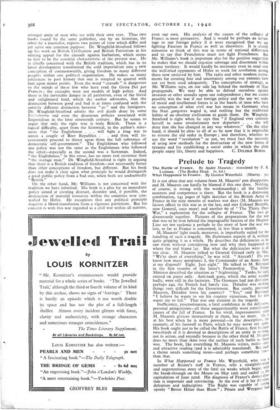Patriotism and Principles
War by Revolution. By Francis Williams. (Routledge. is.)
A DEMOCRACY, even when it is at war, still preserves the essenlial differences of outlook within the common purpose of its citizens. Our present Government includes men of entirely different train" ing and political opinions, who are united nevertheless in th'Ir determination to preserve for this country, and as far as rheY can for others, the right of men to criticise those in- authority, and to live at peace with those who differ in race, efigionli or it serves. Our unity is not totalitarian. It is the deeper and nation. political opinion. In this the Government reflects the stronger unity of men who see with their own eyes. Thus two books issued by the same publisher, one by an historian, the other by a journalist, express two points of view which differ and yet serve one common purpose. Dr. Wingfield-Stratford follows up his work on British Civilisation and British Patriotism in his stirring appeal for the crusade against barbarism, which seems to him to be the essential characteristic of the present war. He is chiefly concerned with the British tradition, which has in its latest development transformed the cold imperialism into a new conception of commonwealth, giving freedom to many different peoples within one political organisation. He makes so many references to past history that one is tempted to quarrel with him upon minor points. Even the word " crusade " is dangerous to the minds of those few who have read the Gesta Dei per Francos ; the crusades were not models of high policy. And there is the inevitable danger in all patriotism, even of the literal and enlightened kind, which the author advocates, that the distinction between good and bad is at times confused with the entirely different distinction between " us " and the foreigners. Dr. Wingfield-Stratford admits the evil deeds done by some Etm••.'ishmen and even the disastrous policies associated with Imperialism in the later nineteenth century. But he seems to argue that only the right way is truly British. There is a logical difficulty, apart from the historical, in the author's state- ment that " the Englishman . . . will fight a long war to annex a couple of Boer Republics . . and then will in- continently proceed to thrust upon them the full substance of democratic self-government." The Englishman who followed one policy was not the same as the Englishman who followed the other—especially as the second was a Scotsman. Indeed, " the Englishman," in this sense, has no more real existence than " the average man." Dr. Wingfield-Stratford is right in arguing that there is a British tradition of freedom—not necessarily better than other conceptions of freedom, but different. But his book does not make it clear upon what principle he would distinguish a good public policy from a bad one, when both are undoubtedly
British."
On the other hand, Mr. Williams is not concerned with the tradition we have inherited. His book is a plea for an immediate policy aimed at creating distrust, disorder and, if possible, the destruction of material resources within the countries now con- trolled by Hitler. He recognises that any political principle requires a blood-transfusion from a vigorous patriotism. But his concern is with this war regarded as a civil war within all nations,
even our own. His analysis of the causes of the collapse of France is. most persuasive. And it would be perhaps an advan- tage to our foreign policy if it were recognised that we are fighting Fascism in France as well as elsewhere. It is clearly nonsense to think of this war in terms of national differences and to say that Frenchmen must not fight Frenchmen. But Mr. Williams's book is important also for the positive suggestion he makes that we should organise sabotage and discontent within enemy territory. It would hardly be necessary even to send over the well-tried opponents of Hitler to work for revolution among those now enslaved by him. The radio and other modern instru- ments for creating fear and uncertainty among our enemies have not yet been used adequately. The conceptions of strategy, as Mr. Williams says, on our side lag behind the methods of Nazi propaganda. We may be able to defend ourselves against invasion or other assaults upon our independence ; but we cannot possibly win the war if our foreign policy and the use we make of moral and intellectual forces is in the hands of men who have no conception of what civil war has meant in Germany when the Nazi gangsters waged it, and nothing but the traditional habits of an obsolete civilisation to guide them. Dr. Wingfield- Stratford is right when he says that " if England ever commits herself to some revolutionary new departure . . . she will deny that she has changed in any way whatever." On the other hand, it should be clear to all of us by now that it is impossible to restore the old order in Europe ; and therefore, whether we use the word " revolution " or not, we must face the necessity of using new methods for the destruction of the new forms of tyranny and for establishing a social order in which the plain people enjoy life, liberty and happiness. C. DELISLE Bums.



























 Previous page
Previous page